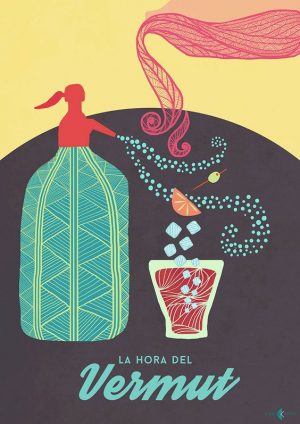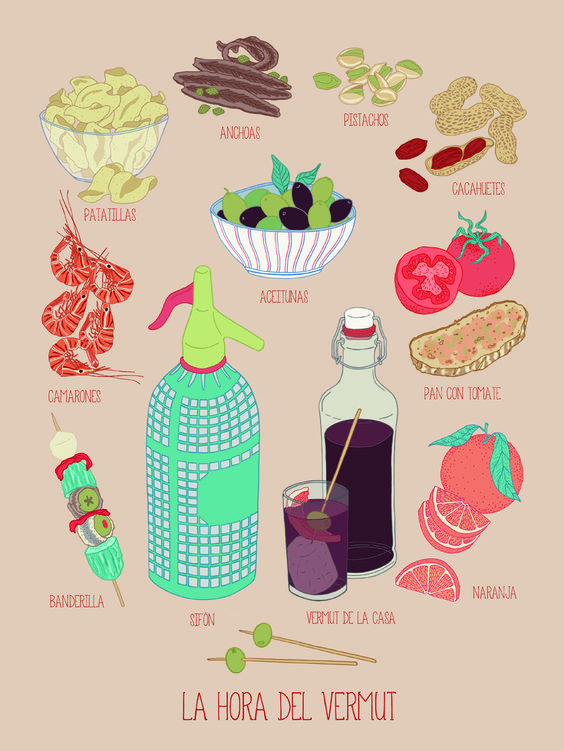Whether you are inclined to a beer or a glass of wine, having a drink and a small bite is part of Spanish culture as much as eating paella on Sundays.
Every neighbourhood is populated with dozens of bars, from the tasca de barrio to the new restobar or gastropub. Almost every bar will have at least one tapa to “soak the alcohol” before midday meal, although this meal happens well after the midday has passed.
And despite what you might think, and also despite the fact that us, Spaniards, organise our lives around meal times, el aperitivo is not about the food we eat or the drink we have, it’s about the charla and the social aspect of it.

Having a quiet coffee on your favorite cafetería reading the newspaper? Totally! Having a glass of wine in your local bar with a good book, or the only company of the waiter? Yeah, why not? Having the aperitif on your own? Mmmm, sounds weird. I am not saying you can’t. I am all about breaking rules and do the independent thing ignoring social pressure and constructs, but the truth is that having the aperitif on your own is lacking the element that makes the aperitif what it is.
Aperitivo con amigos (with friends), con colegas de trabajo (colleagues), con la familia (family), con el jefe (boss), los vecinos (neighbours)… That is the key element.
Now, the goal of the aperitivo is to whet the appetite (abrir el apetito) because el aperitivo is no irse de tapas ─ although it has similar elements ─ and filling you belly with tapas, but to have a drink and a small bite to encourage the secretion of gastric juices that will help with your digestion.
Now we can all agree that the practice of the aperitif is healthy, right?
El aperitivo is not only a Spanish tradition, of course not. France has l’apéro, which is the same but maybe with different drinks and appetisers. The idea is to engage in a social activity while helping your glands salivate, before you go back home to eat.
See? There is a reverence towards the meals. We honour midday meal (which is the main meal of the day in Spain) by preparing ourselves before with the aperitif, and then, by slowing down in the sobremesa and/or siesta after it.
It is important, so it has its own ritual.
My last aperitivo con amigos was this month when I was in my hometown (Burgos) for a quick visit. At around 1pm my friend and I went to small bar and ordered a glass of vermut which came accompanied with a thin white envelope containing few slices of jamón.
Talking about vermouth.
In fact, having a vermouth is coming back to fashion after years of wine and beers preference. All of a sudden, vermouth is sexy again.
Tomar el vermú (as this spelling is also accepted by the RAE) is another way of referring to tomar el aperitivo, as the traditional drink would have always been vermouth.
Vermouth is a combination of white wine, absinthe (ajenjo) and other herbs and fruits. It has been the quintessential drink to have before a meal, so much that the word vermut / vermú is used to refer to the social event of having a drink and a bite to whet the appetite.


Other options?
Sure, I remember my mum (who would never drink alcohol) would always have a Bitter instead (Bitter Kas is a fizzy drink from Spain). And there is also the widely extended selection of wines and beers, espumosos (sparkling wine)…
What could be better than a rubia and a plate of olives to make your juices flow? And by a rubia, I mean a beer, a blonde beer.
Things that the waiter can put in front of us (poner) or bring to us (traer)? – Poner and traer being the most commonly used verbs to order in a bar.
- una rubia y unas aceitunitas
- una cañita
- un chato (de vino)
Things that we can eat in this context?
Pickles (encurtidos: aceitunas, cebolletas, pepinillos, anchoas (boquerones) en vinagre… varied banderillas (skewered appetizers) such as the long-standing capataz or pincho de bonito. Possible to have patatas bravas, a plate of cheese, and pinchos or montaditos.
Watering mouth already? Good, because that is the whole point.



If you’re in an upscale restaurant, is it appropriate to say “ponme una copa de vino” or is it just reserved for bars?
In that context, I’d use “me pone una copa de vino, por favor” and question intonation, or “póngame una copa de vino” with the “usted” form.